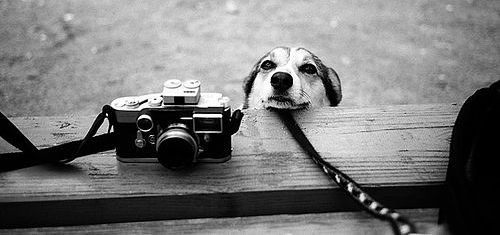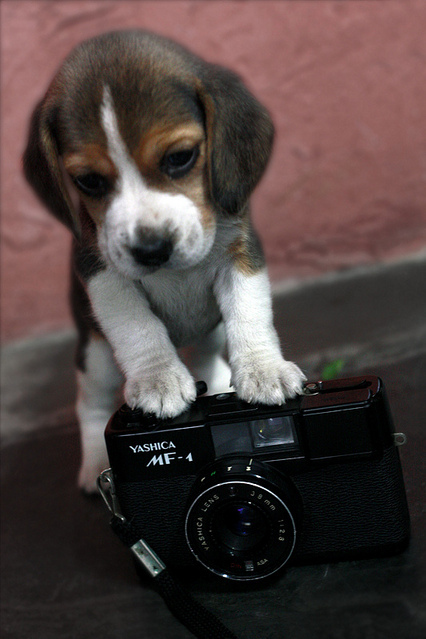
If you take a look at any family’s photo album or browse through your cell phone picture gallery, it is apparent that most of the images represent people and places we love or feel a connection with. Taking snapshots of scenery or adults is a pretty simple and straight forward process most of the time. Children and pets can be quite a bit more challenging to say the least. Especially if you are looking for a good still shot. While children will eventually grasp the idea of being photographed, pets do not understand the concept of what you are trying to accomplish and this can cause them to be rather uncooperative when its photography time.
Below are 10 pet photography tips that might not make you a professional pet photographer any time soon, but will definitely make the pictures you take of your furry friends look a little better and might save you some frustration as well.
1. Introduce the Camera
Some pets may shy away from the camera because they are totally unfamiliar with it. Let’s face it, you probably look pretty ridiculous with that mechanical thing in front of your face that shoots bright light and makes funny beeping sounds. Let your pet become familiar with the camera. They can sniff it, look it over, and maybe even lick it once or twice. This will allow them to grow a little more comfortable each time you pull it out to snap a shot.
2. Get on Their Level
Another key to your pet’s comfort level is to not make them feel forced into a position or situation. Go to where the action is and get down on their level. A good pet photograph is taken from the pet’s perspective or at their eye level. This is best accomplished by kneeling or laying down on the floor and photographing your pet head on.
3. The Element of Surprise
We all know pets love to move around. Getting them to stay still while you look through the viewfinder for the perfect shot can be a tedious and time consuming process. Usually, you end up with a fair amount of blurred “action” shots when you really are not trying to go that route. So get your camera ready and in position, and then have an “assistant” call the pets name or whistle loudly. This will give you a brief moment of still surprise from your pet in which you can capture them in their full glory.
4. Proper Lighting is Natural
There is really no better light source to use in pet photography than the natural light just outside your window. Taking a picture of your favorite pal outdoors or near a window is a great way to insure your picture is not too dark and the correct colors come through. Using a flash can not only lead to unwanted artifacts in your photos it can also scare your pet, which might make future photography sessions more difficult.
5. The Eyes Have It
Nothing can convey more about your pet’s personality then their eyes. Unfortunately, it is also very difficult to take a picture of your pet without their eyes looking funny or reflective, which can often make them look menacing or alien-like. It is important to find a location that is evenly well lit and avoid a head-on flash from your camera directly into your pet’s face. This will reduce the reflective effect. If you wish, you can also use photo editing software after the picture is taken to reduce the reflection and glare.
6. I’m Ready for My Close-Up
If your camera has a “macro” setting then you can use this option to really get up close and personal with your pet subject. Try to get as much of your pet as you can in the picture as some of the best pet photographs are taken up close and personal.
7. Emphasize the Personality
Different pets have different personalities, so in order to truly capture your pet’s uniqueness try and take a photo that best shows their traits. If you have an older pet who likes to take it easy then photograph them while they are lounging around. If your pet is hyper-active and loves to be rambunctious then try and catch them at play or with their favorite toy.
8. Timing is Everything
Try and decide what type of shot you are going for and plan ahead. If you want a more solemn pose from your pet then try and schedule your photo shoot when they are the least active, usually around nap time or after. If you are going for a playful action shot then schedule your session when they are at full energy and eagerness. If you want your pet to look happy and cute then be sure to take your photo when they are in peak physical condition.
9. Experimentation is Key
Sometimes it is difficult to get that perfect shot that you have imagined in your head. Try broadening your horizons by implementing several different ideas. Vary your position, angle, and environment and take a boat load of pictures. This way you can choose the very best from the lot and ensure you have a few outstanding shots that you are satisfied with.
10. Patience is a Virtue
Getting a terrific pet photograph takes time. Very rarely do you take a perfect picture on the first few attempts. Be prepared to spend a little time with your pal in order to get some truly outstanding pictures. It is almost certain that your pet will not fully cooperate from the get go but after a few attempts they will become more comfortable around the camera.
 |
Following these simple pet photography tips can help you get the most out of your photo session. Taking quality pictures of your pet is usually a fairly difficulty endeavor but with time and focus you can capture some glamorous memories for your family and friends to enjoy. So, grab the camera and your photogenic pet and get started! |
| Russ Barker routinely encourages customers to share pictures of their pets on the Dog tag Art website. Customers routinely ask Russ Barker how they can get their pet to sit still for this picture, so Russ decided to write a blog article with some simple pet photography tips that anyone can follow. Russ is a veritable Swiss army knife of talent, working for Dog Tag Art, a group of pet enthusiasts who produce pet ID tags that are high-end and high-quality. These custom dog tags feature commissioned artist designs from all over the world as well as photos and artwork uploaded by individual customers. |  |

